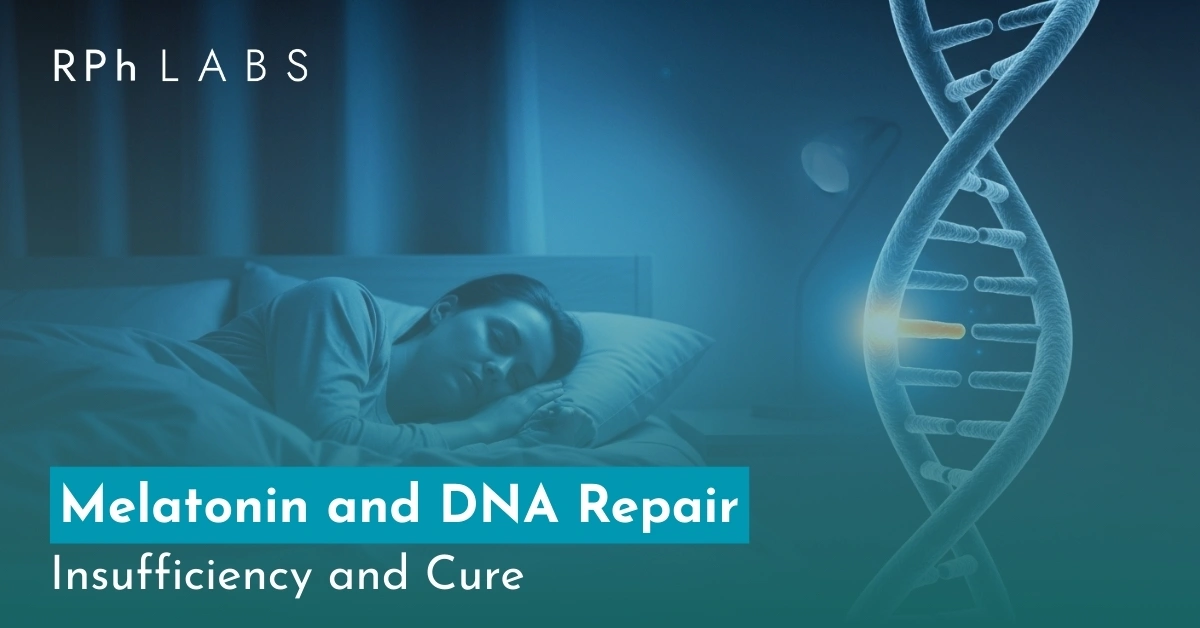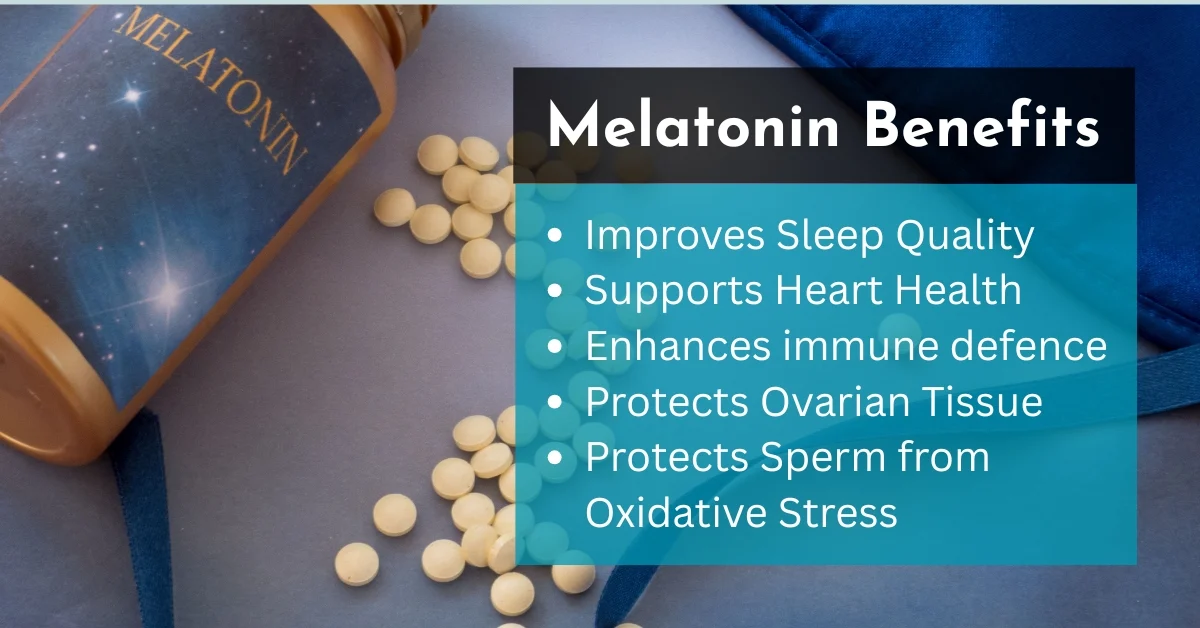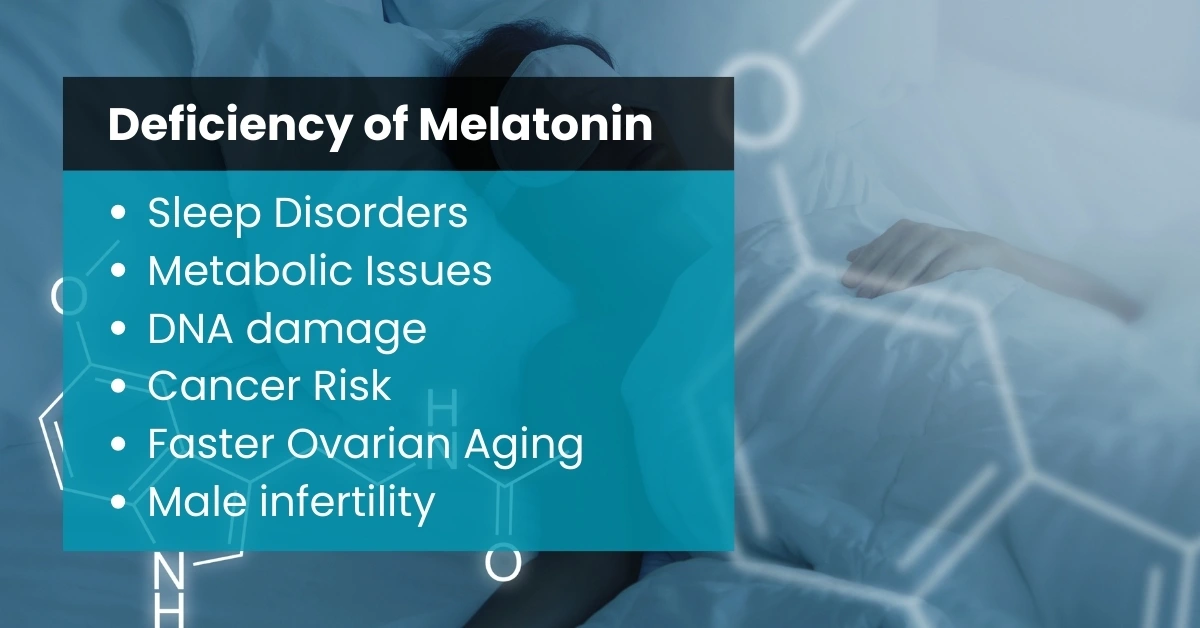
Melatonin isn’t just the “sleep hormone.” The Melatonin and DNA Repair is not just a theory but a fact. This hormone helps the body repair its DNA, protecting your heart and keeping your metabolism balanced. Insufficient levels may cause mutations, which may lead to cancer as well. This hormone is a powerful antioxidant; hence, issues arising from insufficiency of antioxidants can be expected – these issues may differ in men and women, i.e., females may experience ovary issues like polycystic ovary syndrome (PCOS) while men may experience different issues. People working night shifts, due to disrupted circadian rhythm, are prone to these conditions; however, here we have discussed some ways to optimize them naturally.
Melatonin and Its Production
Melatonin is a hormone mainly produced by the pineal gland (a small gland in the brain). Its production increases when it’s dark and decreases when exposed to light. According to PubMed, peak levels occur between 2 a.m. – 4 a.m. Beyond sleep, melatonin also supports blood pressure regulation, heart health, metabolism, and immune function.
Melatonin and DNA Repair: Myth or Reality
Yes. Melatonin is a powerful antioxidant that scavenges harmful free radicals (unstable molecules that damage cells). It activates DNA repair enzymes, helping correct mistakes in DNA strands that could lead to mutations. Night shift workers often show diminished ability to repair DNA damage due to low melatonin. When DNA isn’t repaired due to low melatonin, the risk of cancers like prostate, breast, colon, and skin cancer may increase.
Melatonin Benefits Beyond Sleep
- Improves core sleep quality and circadian rhythm.
- Supports heart health by reducing blood pressure and oxidative stress.
- Enhances immune defence and protects organs from age-related damage.
- Protects ovarian tissue, slows ovarian ageing, supports fertility.
- Protects sperm DNA from oxidative stress, supporting reproductive health.

Is your mental health medication working as it should?
If not, Pharmacogenomic testing (PGx testing) from a CLIA-accredited lab, such as RPh LABS, can help you and your doctor select drugs and dosages based on your genome.
Melatonin Deficiency May Cause
- Sleep Disorders: Insomnia, poor sleep quality.
- Metabolic Issues: Obesity, insulin resistance, type 2 diabetes risk.
- DNA damage and cancer risk: Breast, prostate, colon, skin cancers.
- Mood disorders: Anxiety, depression, irritability.
- Women: Faster ovarian aging, reduced fertility.
- Men: Reduced antioxidant defence in sperm, increasing mutation risk.

How Night Workers Can Boost Melatonin Naturally?
- Light Control: Avoid bright screens before bed, use blackout curtains, and wear eye masks.
- Temperature: Keep bedroom cool (60–67°F) to enhance melatonin production.
- Routine Adjustments: Sleep and wake at consistent times, even on days off.
- Meal timing: Avoid heavy meals late at night; eat earlier to improve melatonin rhythm.
- Exercise timing: Morning or early afternoon workouts maintain natural melatonin cycles.
- Melatonin Supplementation: Helps in restoring sleep and DNA repair rhythms when natural production is disrupted. It may be consumed an hour before sleeping with a not-so-heavy meal.
Recovering Melatonin Insufficiency
While some of the damages may or may not be compensated, adding some foods to your life (in a balanced manner), undisrupted sleep, and daily exercise can help you recover or at least minimize upcoming health damages. Following are some of the ways;
Foods That Repair DNA
Please keep in mind that maintaining a healthy portion size is the key to avoiding any side effects.
Berries (rich in flavonoids & antioxidants)
- Blueberries, strawberries, blackberries, raspberries.
- Help reduce oxidative stress and DNA damage.
Nuts & Seeds
- Almonds, walnuts, pistachios, flaxseeds, chia seeds.
- Provide vitamin E, selenium, and omega-3s to protect DNA.
Fish & Seafood
- Salmon, sardines, mackerel, tuna, oysters.
- Omega-3 fatty acids reduce inflammation and support DNA repair.
Whole Grains & Legumes
- Quinoa, oats, brown rice, barley, lentils, chickpeas, black beans.
- Provide folate, fiber, and antioxidants for healthy DNA replication.
Vegetables
- Spinach, kale, broccoli, Brussels sprouts.
- Rich in folate and carotenoids for DNA synthesis and repair.
| Food Category | Specific Foods | DNA Repair & Antioxidant Benefits | Melatonin Support |
| Berries | Blueberries, Strawberries, Blackberries, Raspberries | High in flavonoids and polyphenols; reduce oxidative stress and DNA strand breaks | May modestly increase circulating melatonin levels due to tryptophan content |
| Nuts & Seeds | Almonds, Walnuts, Pistachios, Flaxseeds, Chia Seeds | Rich in vitamin E, selenium, omega-3 fatty acids; protect DNA from oxidative damage | Omega-3 fatty acids and tryptophan promote melatonin synthesis |
| Fish & Seafood | Salmon, Sardines, Mackerel, Tuna, Oysters | Provide omega-3s and selenium, reduce inflammation, and enhance DNA repair enzymes | Selenium and tryptophan-rich, aiding melatonin production |
| Whole Grains | Quinoa, Oats, Brown Rice, Barley | Folate-rich; supports DNA synthesis and repair, stabilizes genome | Tryptophan content can boost melatonin |
| Legumes | Lentils, Chickpeas, Black Beans | Contain folate and polyphenols, reduce oxidative stress, aid DNA repair | Tryptophan in legumes helps melatonin production |
| Vegetables | Spinach, Kale, Broccoli, Brussels Sprouts | Carotenoids and folate protect DNA; antioxidants neutralize free radicals | Indirect support via overall antioxidant defense |
Melatonin DNA Repair Supplements
- Help in improving sleep, protect DNA, and reduce oxidative stress if natural melatonin is low.
- Look for high-quality, third-party tested products.
- Combined with lifestyle adjustments, supplements may support DNA repair naturally.
- Not a replacement for sleep, diet, or proper lifestyle habits.
Melatonin Reducers: You Should Avoid
- Bright light exposure at night.
- Irregular sleep schedules.
- Caffeine or alcohol close to bedtime.
- Night shift work without protective strategies.
Takeaway
- Melatonin is more than a sleep aid.
- It repairs DNA, protects your heart, and supports metabolism.
- Lifestyle, light control, and diet are key to maintaining melatonin.
- Supplements can help, especially for night shift workers.
- By understanding and supporting melatonin, you actively protect your DNA and overall health.
Frequently Asked Questions
By scavenging DNA-damaging agents and, as per some studies, stimulating DNA repair from oxidative mutations (more human evidence required), melatonin may help the body to repair its DNA.
Yes, especially for night shift workers or low natural levels. Adults usually consume 1 – 3 mg 30 minutes to 1 hour before sleeping with a liquid or a meal.
Dark rooms, eye masks, cool temperature, routine sleep, early meals, and morning exercise. If still experiencing trouble, you may want to consult a doctor about melatonin supplements.
Melatonin deficiency may lead to DNA damage, and this damage increases the chances of breast, prostate, colon, and skin cancers.
Disclaimer: This blog is for informational purposes only and does not constitute medical, legal, or professional advice. While we strive for accuracy, errors or omissions may occur.



Leave a Reply